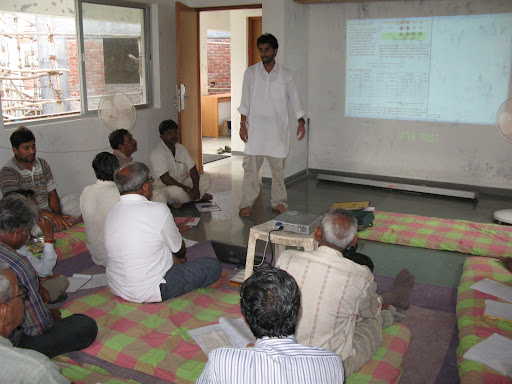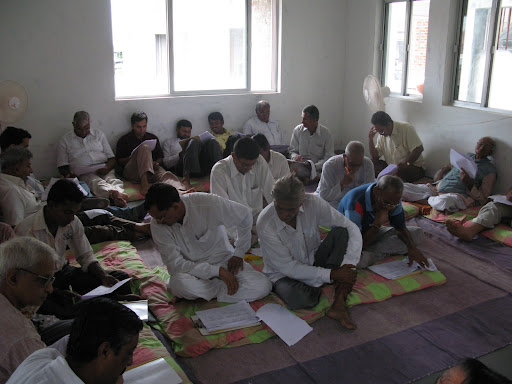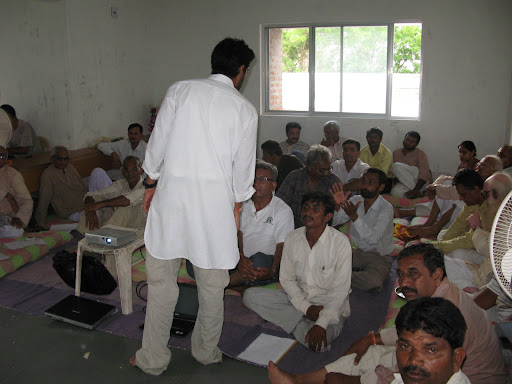 I'm in catch-up mode with blog posting as it is actually my last day in India, so the quality of posts is going to suck, and you'll get a bunch of writing in succession, but here we go anyway. The farmer's meeting was the climax of the summer in terms of the work I did with Jatan. Kapilbhai arranged a meeting of 40 of Gujarat's most advanced organic farmers to come to a retreat where we would deliberate on the future of certification in Gujarat (from Jatan's perspective). The purpose of the meeting was to introduce a few certification systems (including the one we developed this summer), explain how they worked, and give the farmer's a choice on how Jatan should proceed (support one, some, all, or none of the certification systems presented... we were prepared for any of these options).
I'm in catch-up mode with blog posting as it is actually my last day in India, so the quality of posts is going to suck, and you'll get a bunch of writing in succession, but here we go anyway. The farmer's meeting was the climax of the summer in terms of the work I did with Jatan. Kapilbhai arranged a meeting of 40 of Gujarat's most advanced organic farmers to come to a retreat where we would deliberate on the future of certification in Gujarat (from Jatan's perspective). The purpose of the meeting was to introduce a few certification systems (including the one we developed this summer), explain how they worked, and give the farmer's a choice on how Jatan should proceed (support one, some, all, or none of the certification systems presented... we were prepared for any of these options).
It was an action-packed meeting for the entire three days, and it was really amazing for me to see farmers from all over Gujarat spending time and effort with something I helped to make. It was really thrilling during the sessions where we introduced our system (JCS for Jatan Certification System... yea the name sucks so feel free to suggest a cool name in Gujarati to replace it), and watch the farmers really engage in the discussion and debates over aspects of the system. I was encouraged that all the feedback sessions for JCS ran over time. We even had mock farm appraisals (we call them appraisals to
 de-emphasize the connotation of policing in the term "inspection") for JCS where the farmers went to a nearby organic farm and used our system.
de-emphasize the connotation of policing in the term "inspection") for JCS where the farmers went to a nearby organic farm and used our system.In the end the farmers decided that they wanted to go forward with JCS; it was the best fit for the realities of Gujarat. In fact, that was our main aim. The other systems may allow broader market reach and more recognition from buyers, but the standards and procedures were not sensitive to the organic farming context in Gujarat specifically. Our system offers a good fit, albeit with many limitations including lack of
 influence outside of Gujarat since the system is backed by Jatan which doesn't have much of an influence outside of the state. But Jatan as an organization has enough goodwill and credibility within Gujarat that a certificate issued by them would stand in local markets, which from my limited experience seems to be the first step for farmers to gain market advantages with organic.
influence outside of Gujarat since the system is backed by Jatan which doesn't have much of an influence outside of the state. But Jatan as an organization has enough goodwill and credibility within Gujarat that a certificate issued by them would stand in local markets, which from my limited experience seems to be the first step for farmers to gain market advantages with organic.I realize that this blog has lately been light on talking about my work and more on trying to sound smart and funny. This is mostly because I prepare weekly reports for my internship requirements and so I would get bored reusing material out of that stuff to create blog posts. But what that means is if you are interested in my work, definitely let me know and I can share all kinds of gory details with you which have already been recorded and are nicely formatted. But I will now, for the sake of completeness, write out a high-level outline of what I did this summer:
- Arrived in Baroda and learned about how Jatan, an NGO promoting organic farming in Gujarat, works. Lived at the Vinoba Bhave Ashram, with Jatan
- Learned through literature, discussions, conferences, etc. about organic farming, the state of marginal farmers in Gujarat, the Indian agriculture system, international and Indian organic certification systems (including strengths and weaknesses)
- Hung out at organic retail outlets in Baroda to talk to consumers and learn about their experiences, motivations, feelings, etc. about organic
- Hung out with farmers through farm visits; I now know most of the most experienced organic farmers throughout Gujarat.
- Conceived of, designed, and iterated on JCS, a system (software, forms, processes) to certify farmers in Gujarat as "Sajiv Kheti", which literally means "living agriculture" and is roughly equivalent to organic farming. The certificate would be issued by Jatan and is based on the principles of openness, inclusiveness, and trust. The main unique components of JCS are that the appraisals are done by experienced organic farmers who serve more as mentors than inspectors; certification is based on quantitative evaluation of a piece of land through the "Sajiv Kheti Scorecard" which assigns points to criteria along the three categories of environment, health, and social considerations to produce a "Sajiv Kheti Index". Granting a certificate with an index indicator allows for more than a binary accept or reject scenario which is too limiting in Gujarat; An indicator of the degree to which the farmer is dependent on his land for his livelihood, a "Subsistence Index", is also included in the certification; and the system is mostly trust-based, run by volunteer farmers, and with minimal fees, which makes it a system of and by the farmers to a large extent.
- Presented JCS to farmers and got validation on the system; plans to fully operationalize and certify farmers by the end of the year have been finalized. We recently got the news that in Kachchh, farmers are self-organizing to videotape meetings to introduce JCS to share with farmers across the region. The media may also be getting involved to spread the word to farmers that such a system is being offered, and to explain how it works.
- Co-wrote a paper for the ICTD conference which surveys the information needs in "agriculture value chains" in developing regions and current successes, gaps, and opportunities in addressing those needs with appropriate information systems.
- Wrapped up with more meetings in Delhi to present the work and discuss next steps
No comments:
Post a Comment